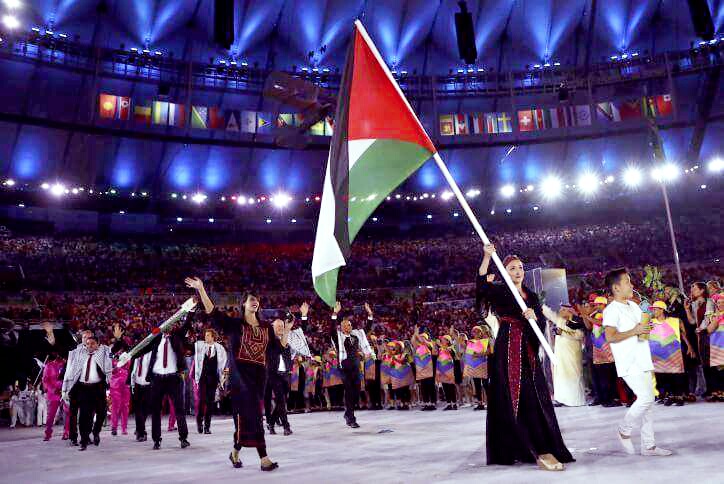
Palestine’s Olympic Flag Bearers

What an honour to step out into the opening ceremony of an Olympics, among the most spectated events on earth, carrying the flag for your country. What an even greater honour when your land is a disputed territory, and your people’s sovereignty has been challenged for over 70 years. Next year’s 2020 Summer Olympics in Tokyo will be the nineteenth since the Nakba.
Palestine however, has only competed in the past six, having been recognised by the International Olympic Committee (IOC) only in 1995. Whilst the partially-recognised state has sent more athletes to compete each year since its initial two in 1996, it was still only six in 2016 some twenty years later, and Palestine has yet to take home a medal.
Ahead of another Olympic year in 2020, another chance for Palestine to remind the world proudly of its existence on a global stage, we take a look at the six athletes who have had the honour of bearing the flag for Palestine at the Opening Ceremony.
In examining these individual’s narratives every four years over the past six Olympics, we also trace the broader story of how the Palestinian situation has evolved over the past two decades, along with the myriad of challenges athletes living under occupation have to endure and overcome.
1996, Atlanta.
The First Flag Bearer: Majed Abu Maraheel, 10,000m, distance runner (Athletics)
“I shall run for that peace – peace and only peace.”
Majed Abu Maraheel, from the Nusseirat camp in Gaza, was 32 years old when he competed at the Atlanta Olympics, and father of five children. “My goal is not to win the gold, but to let the world know that there is a Palestine,” he stated ahead of the competition, acknowledging his outsider chance.
Previously working as a labourer in Israel, tending flowers in greenhouses, Majed used his daily commute as his training, jogging the 20 kilometre journey each morning from Gaza City to the checkpoint at Erez.
Working across the border was a fact of life for many Palestinians during this time, by the mid-1980s 43% of the Gazan workforce were engaged in labour in Israel. As a result, the first Intifada in the late 80s and early 90s drew parts of the Israeli economy to a halt and since then, Israel has largely replaced the Palestinians it used as a source of cheap labour with migrants from developing countries.
Majed himself took no part in the Intifada when it erupted in Gaza in 1987, choosing instead to focus on sport. And yet still Majed could not evade the violence. Whilst running to the beach one summer morning in 1991, Majed was caught in the fire between Israeli soldiers and children throwing stones. He was shot in the arm, crushing his bone and leaving behind a six-inch scar. Majed feared he wouldn’t run again, but thankfully, these fears were unfounded.
By the time of the 1996 games, Majed was no longer a labourer but rather working as part of the special security team that guarded President Yasser Arafat. Majed considered Arafat a hero and so his job was a true honour. It was Arafat himself who personally handed him the folded flag he carried for Palestine at the opening ceremony.
Majed was eight years old at the time of the Munich Olympics, when Palestinian gunmen killed eleven Israeli athletes and officials. Speaking in ‘96 about this, he said, “We were at war then. They killed us; we hijacked them. They occupied us; we despised them. But that was a very black era. Now we’ve turned the page and there is peace. And I shall run for that peace – peace and only peace.”
A popular local figure, cheered on by children as he trained along the streets of Gaza, Majed had no coach, next to no training facilities and wore knockoff tennis shoes on his feet. It wasn’t until he competed in the Arab Games in Cairo that he’d ever even ran on a first-class track. He almost missed the 10,000-metre race there after spending three nights detained at the border, arriving with mere hours to go and an hour of sleep from three days. “If I had to crawl around that track on my hands and knees, I would have done so to carry my flag,” he said.
A fund providing financial aid to Olympic participations covered his expenses for Atlanta, but did not extend to the pre-Olympic training he hoped to attend in Morocco.
In Atlanta, Majed finished 21st in the 10,000m race and so did not advance to the final.
2000, Sydney.
The Second Flag Bearer(s): Samar Nassar, 100m breaststroke (Swimming) and Ramy al Deeb, 20km walk (Athletics)
“The dream has become a reality.”
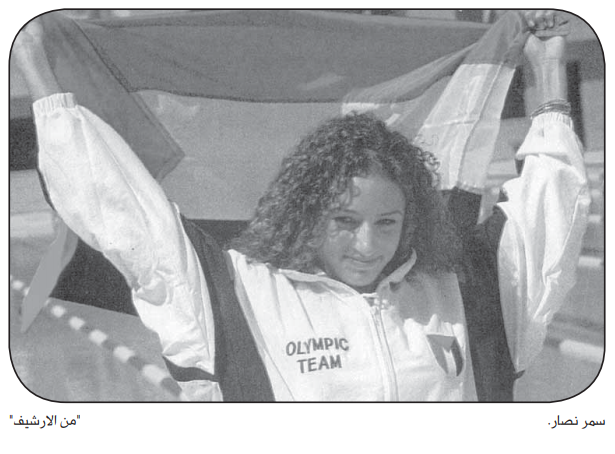
There is duplicitous information on which of the two sportspeople representing Palestine in Sydney carried the flag at this Olympics, or whether in fact they did it together. If you can recall, please get in touch and help us piece together the puzzle!
22 years old Samar, a graduate in molecular biology who lived in Jordan, cried as she was chosen to carry the flag for Palestine. “I never believed I would represent my country in an international championship or go to the Olympics. The dream has become a reality.”
Meanwhile Ramy stated, “It was a wonderful opportunity; I have dreamt of it all my life… and I thank God that this dream has come true.” He added that his participation during that period was not solely to reap world medals but a period of enhanced presence of Palestine in international forums and the affirmation of Palestinian rights to participate and raise the flag.
This particular Olympics, which took place in September, happened to coincide with the start of the Second Intifada, presumably giving Palestinians more to think about than a sports competition.
2004, Athens.
The Third Flag Bearer: Sanaa Abu Bkheet, 800m, middle-distance runner (Athletics)
“The situation in Gaza doesn’t allow us to prepare properly for medals.”
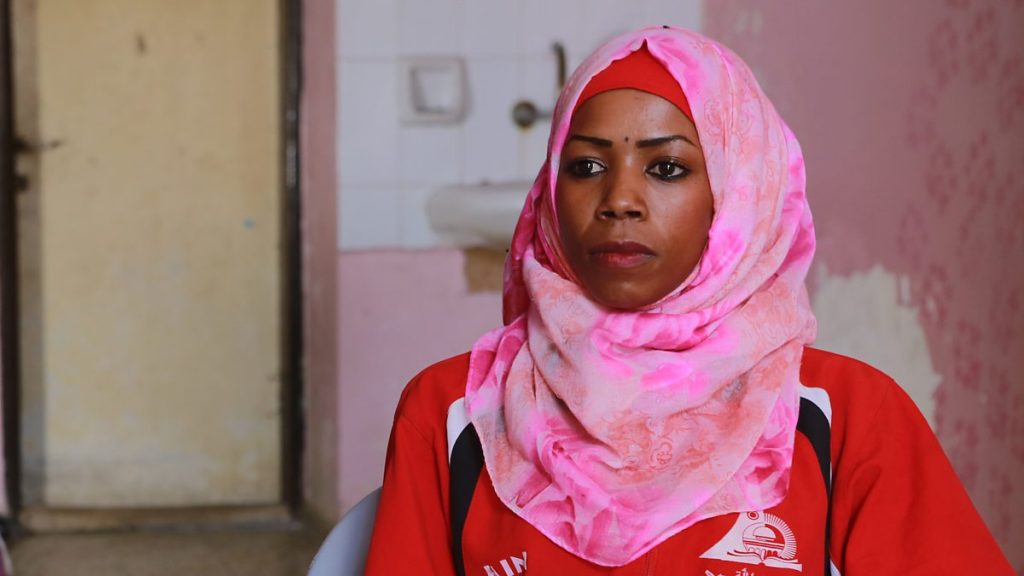
The first woman to carry the Palestinian flag at the Olympics, as well as Gaza’s first Olympic athlete, Sanaa’s story echoes what we heard in 1996, participation was symbolic, and chances were hampered by limits to training opportunities compared to other professionals.
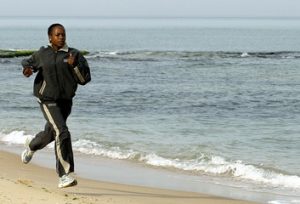
“My participation was symbolic, because the situation in Gaza doesn’t allow us to prepare properly for medals,” Sanaa told the BBC, describing the sand track she trained on, the lack of competition and the mere month of international training she was sponsored for. She did not own a pair of running shoes until a few months before Athens, when a European TV crew bought her a pair of trainers after filming a story about her. “I’m faster barefoot, but you are always getting stickers in your toes,” she commented.
Added to that was the gendered dynamic of living in a conservative society, although the sheer doggedness athletes tend to possess was enough to overcome this element: “when I persisted, people accepted me and began to encourage and support me.”
Describing the moment she carried the flag for Palestine, she said “It was such a beautiful scene, because as soon as everyone saw the Palestinian flag, they began clapping.”
Since the siege has been implemented on the Gaza strip Sanaa has been unable to compete internationally again.
2008, Beijing.
The Fourth Flag Bearer: Nader Al-Massri, 5000m (Athletics)
“I feel a freedom when I start running. If I don’t train, I feel like everyone else in the Gaza Strip.”
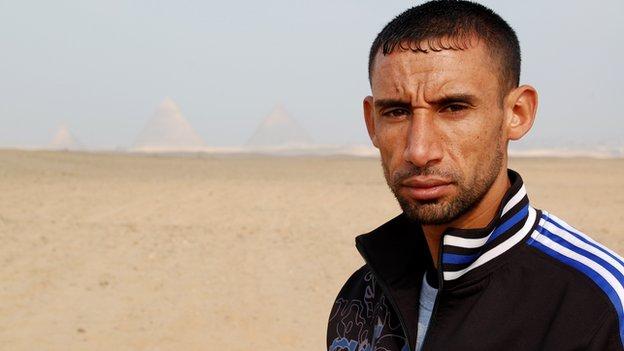
Growing up, kids would shout “Run Nader Run!”as he pounded along the streets of Gaza. Committing himself to the sport, in 1999 he flew on an airplane for the first time, competing in an 8km race in snowy Belfast.
“When I was young, before I had a family, I’d even run when there was an Israeli invasion or bombing in Gaza City,” Nader said on the escapism he finds through running. “I feel a freedom when I start running. If I don’t train, I feel like everyone else in the Gaza Strip.”
Nader has had to spend a career alone, with nobody at his level in the small enclave. He trained in trainers with holes in the sides, 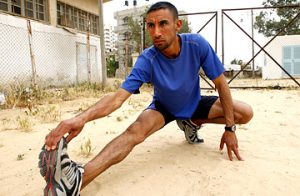 running along war damaged roads, or else the broken and unfinished sand track at Gaza City’s Yarmouk stadium. Even the time he saved up enough from his salary for new shoes, he couldn’t find any for sale in Gaza.
running along war damaged roads, or else the broken and unfinished sand track at Gaza City’s Yarmouk stadium. Even the time he saved up enough from his salary for new shoes, he couldn’t find any for sale in Gaza.
Denied exit after exit for competitions and even training opportunities, Israeli human rights agency Gisha successfully campaigned for Nader to be allowed an exit permit to compete at Beijing, though Director of Gisha Sari Bashi stressed “you shouldn’t have to be an Olympic athlete to exercise your right to leave Gaza.”
If he could only safely train consistently outdoors for a few months, Nader believed he could lose at least a minute off his time. He reported that Chinese experts who saw him run in Beijing told him if he could stay with them to train for a year or two, he could be world record marathon potential. A theory never tested.
Since the Beijing games, Nader went on to win the first ever Gaza marathon in 2011, which stretched the whole of the Strip, tip to toe, as well as the Palestine Marathon in 2015, the only time runners from Gaza were allowed out of the Strip to attend.
2012, London.
The Fifth Flag Bearer: Maher Abu Remeleh (Judo)
“I am the first Palestinian athlete who qualifies for the Olympics with his own sweat.”
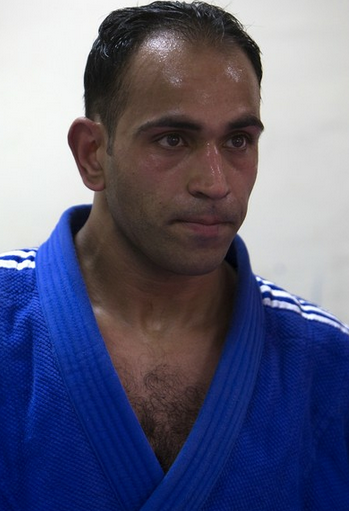
Jerusalemite judoka (now there’s a tongue twister) Maher Abu Remeleh broke the streak by being the first Palestinian flag bearer to come from a discipline outside of athletics. Even more significant than that, he was the first Palestinian Olympian to qualify for his spot on pure merit, outside of special invitation from the IOC which invites people to compensate for difficult conditions in their home training countries. “It’s a great feeling, because I am the first Palestinian athlete who qualifies for the Olympics with his own sweat,” Remeleh remarked on this feat.
He fell in love with judo after going to training with his father as a kid. “The will was always there. I knew he’d be a famous champion and raise the bar for the sport,” his father told CNN.
Maher worked all day in his father’s shop before training at night in a run-down sports club in East Jerusalem. This has been a reoccurring trait with Palestinian Olympians, “As Palestinians we can’t afford not to work,” Maher commented. Though his less than professional training conditions undeterred him, “it does not matter to me where we train. Determination, will power and strength are the most important things to me.”
Maher lost in the second round to Belgian judoka Dirk Van Tichelt, who went on to win Bronze medal at the 2016 Olympics.
2016, Rio de Janeiro.
The Sixth Flag Bearer: Mayada Al-Sayad, marathon (Athletics).
“We mostly just hear bad news from there.”
A dual German and Palestinian citizen, Mayada spent every summer at her family home in Palestine and chose to compete for them at the Olympics, becoming the first woman to qualify for Palestine on merit, as well as its first female marathon runner. She said it was not political reasons which compelled her, but rather purely sport. And yet perhaps the power of Palestinian representation crept in for her, as she told Associated Press how she was compelled to contribute to a different narrative, because “We mostly just hear bad news from there,” as well as hoping more women of Arab descent would follow his footsteps.
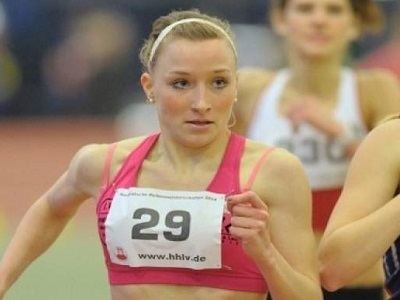
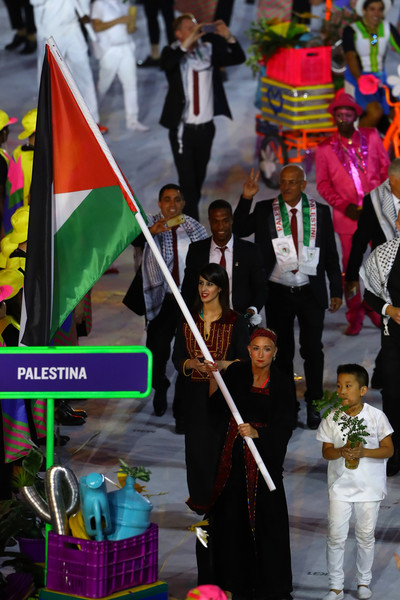
A disparaging article in The Times of Israel from that year describes half of Palestine’s Olympic team at Rio as actually German. One curious case was 55-year-old equestrian Christina Zimmermann, a German businessman, which garnered great attention after he decided to compete for Palestine following a friendship with a Russian rider with a Palestinian father, who suggested he compete for them.
Mayada finished 67th out of 157 in a time of 2:42:28.
We look forward to championing Palestine’s 2020 flag bearer and competitors in Tokyo next summer.
#YallaPalestine #PalestineAtTheOlympics

